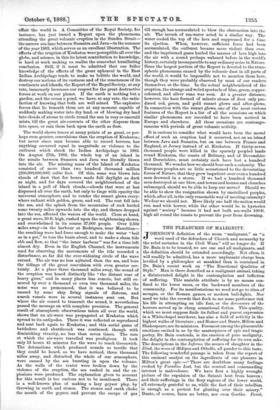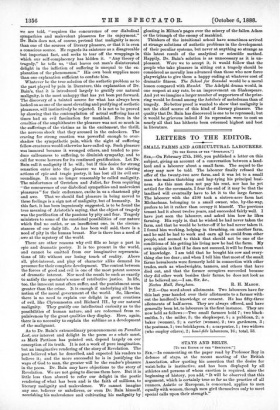THE PLEASURES OF MALIGNITY.
TOHNSON'S definition of the noun "malignant," as " a tl word used of the defenders of Church and monarchy by the rebel sectaries in the Civil Wars," will no longer do. If Dr. Bain is to be trusted, we are one and all malignants, and the definition should be extended accordingly. Not often, it will readily be admitted, has a more unpleasant charge been levelled by a philosopher at mankind than is contained in Dr. Bain's recent work on "The Emotional Qualities of Style." Man is there described as a malignant animal, taking a disinterested delight in the contemplation and infliction of suffering. This amiable attribute is by no means con- fined to the lower races, or the backward members of the community. For its manifestations we need not go to rites of savages, or the Roman games, or modern bull-fights. Nor need we take the crowds that flock to see some performer risk his life in attempting an idle feat, or the devourers of the horrors served up in cheap sensational fiction. This quality, which we must suppose finds its fullest and purest expression in a Whitechapel murderer, has also a field of activity in the highest walks of literature ; and Homer and Dante, Milton and Shakespeare, are its ministers. Foremost among the pleasurable emotions excited in us by the masterpieces of epic and tragic poetry, Dr. Bain contends, is the emotion of pure malignity, the delight in the contemplation of suffering for its own sake. The descriptions in the Inferno, the scenes of slaughter in the Iliad, the woes of (Edipus and Othello, all pander to this taste. The following wonderful passage is taken from the report of this eminent analyst on the ingredients of our pleasure in Milton's great epic :-'--" There are doubtless many feelings evoked by Paradise Lost, but the central and commanding interest is malevolence. We have first a highly wrought picture of the expulsion of the Satanic host from heaven; and their sufferings in the fiery regions of the lower world, all extremely grateful to us, while the fact of their rebellion is enough as a pretext for gloating over their misery." Dante, of course, fares no better, nor even Goethe. Faust,
we are told, " requires the concurrence of our diabolical sympathies and malevolent pleasures for its enjoyment." Dr. Bain does not, of course, pretend that malignity is more than one of the sources of literary pleasure, or that it is even a conscious source. He regards its existence as a disagreeable but important fact, and seeks to tear off the wrappings in which our self-complacency has hidden it. "Any theory of tragedy," he tells us, " that leaves out man's disinterested delight in the infliction of suffering is unequal to the ex- planation of the phenomenon." His own book supplies more than one explanation sufficient to confute him.
Whatever be the true solution of the esthetic problem as to the part played by pain in literature, this explanation of Dr. Bain's, that it is introduced largely to gratify our natural malignity, is the most unhappy that has yet been put forward. The discovery of a tainted source for what has always been looked on as one of the most elevating and purifying of aesthetic pleasures, will instinctively be rejected. It is not to be proved by showing that the contemplation of actual suffering has at times had an evil fascination for mankind. Even in the cruelties of the amphitheatre the pleasure was not so much in the sufferings of the victims as in the excitement, the thrill, the nervous shock that they aroused in the onlookers. The craving for strong emotion was powerful enough to over- shadow the sympathetic pain, which the sight of suffering fellow-creatures would otherwise have called up. Such pleasure was immoral because it wronged others, and tended to pro- duce callousness to suffering, to diminish sympathy, and to call for worse horrors for its continued gratification. Let Dr. Bain call it malignity if he will; but if this desire for strong sensation enter into the pleasure we take in the stirring actions of epic and tragic poetry, it has lost all its evil sur- roundings. It can no longer reasonably be called malignity. The misfortunes of Gretchen and Juliet, far from requiring " the concurrence of our diabolical sympathies and malevolent pleasures " for their endurance, excite in us a chastened pity and awe. That we should find pleasure in being moved to these feelings is a sign not of malignity, but of humanity. In this fact, it has been ingeniously suggested, is to be found the true meaning of Aristotle's saying, that the object of tragedy was the purification of the passions by pity and fear. Tragedy ministers to some of the emotional possibilities of our nature which find no outlet, or an insufficient one, in the circum- stances of our daily life. As has been well said, there is a need of pity in the human breast. Nor is there less a need of awe at the mystery of the world.
There are other reasons why evil fills so large a part in epic and dramatic poetry. It is too present in the world, and cannot be omitted from our imaginative representa- tions of life without our losing touch of reality. Above all, plot-interest, and play of character alike demand its presence for their complete development. The contest between the forces of good and evil is one of the most potent sources of dramatic interest. Nor need the result be such as exactly to satisfy the spectator's sense of retributive justice. In life, too, the innocent must often suffer, and the punishment seem greater than the crime. It is enough if underlying all be the notion of the moral government of the world. So, likewise, there is no need to explain our delight in great creations of 'evil, like Clytemnestra and Richard III., by our natural malignity. They gratify our intellectual curiosity as to the possibilities of human nature, and are redeemed from re- pulsiveness by the great qualities they display. Here, again, there is no necessity to explain the sublime as a development of the malignant.
As to Dr. Bain's extraordinary pronouncement on Paradise Lost, our interest and delight in the poem as a whole mast, as Mark Pattison has pointed out, depend largely on our conception of its truth. It is not a work of pure imagination, but an imaginative rendering of the story of Revelation. The poet believed what he described, and expected his readers to believe it; and the more successful he is in justifying the ways of God to man, the greater will be the reader's pleasure in the poem. Dr. Bain may have objections to the story of Revelation. We are not going to discuss them here. But it is little less than absurd to refer our delight in the poetic rendering of what has been and is the faith of millions, to literary malignity and malevolence. We cannot imagine any one, believer or unbeliever, or even Dr. Bain himself, nourishing his malevolence and cultivating his malignity by gloating in Milton's pages over the misery of the fallen Adam or the triumph of the enemy of mankind.
Thinkers of the intuitional school have sometimes arrived at strange solutions of esthetic problems in the development of their peculiar systems, but never at anything so strange as this latest result of the analytical or scientific method. Happily, Dr. Bain's solution is as unnecessary as it is un- pleasant. Were we to accept it, it would follow that the people who take pleasure in sitting out a tragedy should be considered as morally less advanced than those who now force playwrights to give them a happy ending at whatever cost of dramatic fitness. The School for Scandal would be a moral lesson compared with Hamlet. The Adelphi drama would, in one respect at any rate, be an improvement on Shakespeare. And yet we imagine a larger number of supporters of the prize- ring would be found among the habiluis of melodrama than of tragedy. No better proof is wanted to show that malignity is not the chief source of this kind of literary pleasure. The quality that Dr. Bain has discovered is one to be repressed; but it would be grievous indeed if its repression were to cost us nearly all that has hitherto been esteemed highest and best in literature.



































 Previous page
Previous page